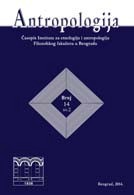HANDLING THE BABY IN THE TRADITIONAL CULTURE AND CONTEMPORARY LIFE IN - SERBIA FROM THE ASPECT OF EARLY MOTOR DEVELOPMENT
HANDLING THE BABY IN THE TRADITIONAL CULTURE AND CONTEMPORARY LIFE IN - SERBIA FROM THE ASPECT OF EARLY MOTOR DEVELOPMENT
Author(s): Lidija Radulović, Dragana ĐurićSubject(s): Cultural Anthropology / Ethnology, Culture and social structure , Family and social welfare
Published by: Институт за етнологију и антропологију
Keywords: Handling babies; traditional culture and contemporary culture; motor development;
Summary/Abstract: In the patriarchal culture of the Serbs children were not regarded as today. Low economic status and hard work in the field meant that mothers carried their babies with them. Baby handling was instinctive, and keeping babies in ljuljkas (a large scarf, used to strap the baby to its mother’s body for carrying around, or to make a hammock) and cradles implied good stimulation of central nervous system and vestibular apparatus. The fast pace of life today, coupled with the desire to have the baby sitting and walking as soon as possible, can have a negative impact on the baby’s development, predominantly because of the use of various aids that frequently impose a certain position upon the baby that hinders its proper motor development at this early age. Comparative method for evaluation of culturally induced concepts in "handling babies" in traditional and contemporary culture. Functional analysis of positive and negative effects in handling children in the past and today.
Journal: Antropologija
- Issue Year: 10/2010
- Issue No: 2
- Page Range: 97-110
- Page Count: 14
- Language: English

